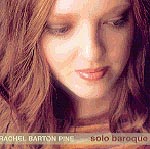Rachel Barton Pine makes a very important point in the liner notes to this CD. After briefly explaining how she came to appreciate and study baroque performance practice, she states that on this recording she has “attempted to capture my most recent thoughts about and understanding of the music of the late 17th and early 18th centuries.” Too often we assume that performers are always trying to make a grand, definitive statement when they produce a recording, especially when confronting monumental works such as Bach’s solo violin music. But here we sense that the violinist is taking us along with her on a journey of exploration, not leading us to a final destination.
Her overall concept with this recital is to place two of Bach’s masterpieces in a context of comparison with solo violin works by other composers of roughly the same time and place. Although the Bach pieces certainly merit attention and admiration for Pine’s cleanly articulated, often beautifully ornamented technique, her generally swift pace leaves scarce breathing room in the slower movements, which, along with her precisely measured phrasing, turns the Adagio into more of a self-consciously exact exercise than a free-flowing, spontaneous expression. Her Fugue is just a bit labored, sounding as if overly concerned with clarity of individual lines at the expense of a cohesive larger structure. I don’t mean to suggest that Pine’s playing is ill-conceived or technically suspect–it’s anything but! In fact, she shows extraordinary mastery of ornamentation and obviously has worked out the most subtle expressive mannerisms with great care–a gently dying end of phrase, a momentary, impassioned surge of tempo, for instance. And she surely knows how to put the fire to a Presto, giving a fine point to each attack with no scraping or scratching–and never sounding frantic.
Interestingly, Pine’s rendition of the Partita shows her and her instrument in more commanding, freer voice, playing as if she’s lived longer with this work–or at least has a firmer grip not only on the linear and harmonic details but on how to illuminate the larger structures, particularly in the famous Chaconne (I really enjoyed her expert bowing through those rapid, slurred arpeggios, really making them sparkle). Compared with the more famous modern-instrument versions of these Bach pieces, Pine’s sound is lighter and smaller. But the baroque violin (hers is a Nicola Gagliano from 1770), with its short neck, wedge-shaped fingerboard, and flatter bridge, offers a warmer tone with none of its modern relative’s penetrating steeliness, partly owing to less string tension. This can be a plus for the listener, as the sound is very easy on the ear over extended periods, and Pine delivers one of the most appealing baroque violin tones I’ve ever heard.
Although the Bach may draw listeners to this CD, it’s the Pisendel Sonata in A minor that emerges as the program’s highlight. The opening Largo sings with brilliant voice, passionately pleading, then fluttering off high into the air, and Pine creates a delightful little drama that leads directly to a catchy Allegro, whose signature is a jumpy little rhythmic figure that Pine fully exploits. The closing Giga is a snazzy dance full of virtuosic delights (and pitfalls), and again Pine seems to be having nothing but great fun with this charming, eminently listenable work.
The Biber Passacaglia is another challenging and substantial piece that’s heard all too rarely–and here Pine is at her most captivating, controlling the myriad expressive aspects with theatrical flair while showing off her violin’s tonal beauty and range. The Johann Westhoff suite is rare and somewhat interesting and easily listenable, but musically it’s not in the same league with the other works. In all, this is a first-rate recital–ideally recorded–that shows an extraordinary young artist at work, offering insights and interpretations that welcome repeated listening and signal a major career in progress. And hopefully, in a few years she’ll give us another update on some of this repertoire, especially the Bach. I’ll be listening. [10/27/2004]
































